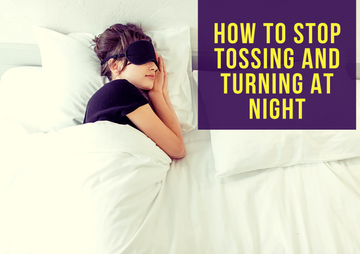How to Stop Tossing and Turning at Night
Tossing and turning during the night can seriously impact your sleep quality and overall health. Disrupted sleep may reduce the body's ability to restore itself and lead to daytime tiredness, even if you believe you've slept for 8 hours.
Sleep quality is essential to physical and mental well-being, and many people unknowingly experience less sleep than they think. Here are some tips to improve your sleep and reduce interruptions during the night.
Understanding Sleep Disruption
Stress, noise, and even sleeping habits can cause frequent wake-ups during the night. Your environment plays a big role in sleep quality, so making sure your room is dark and cool can help improve sleep.
Try setting the temperature of your bedroom to 64-65 °F and avoid late meals, alcohol, or caffeine close to bedtime.
Enhancing Your Sleep Environment
A peaceful sleep environment includes devices with reduced light (use red light mode) and noise. If you exercise late at night, cool down your body with a cold shower to help relax before bed.
Apps that provide soothing sounds like "pink noise" can also improve sleep quality. Sleep stream and Brain.fm are excellent options to explore.
Cooling Down for Better Sleep
Keeping your body cool plays a key role in improving sleep. Try taking a cold shower or going for a short cold-weather walk in the evening. There’s no need to worry that a brief cold exposure will harm your post-exercise recovery.
Wearing wool socks to bed may also help by dilating blood vessels and lowering your core body temperature, helping you fall asleep faster.
Incorporating Stretching, Yoga, and Meditation
Gentle stretching or practicing yoga before bed can significantly improve your sleep quality by reducing muscle tension and promoting relaxation. Consider simple stretches targeting your back, legs, and neck to ease physical discomfort.
Yoga practices such as Restorative Yoga or Yoga Nidra are perfect for calming the body and mind before sleep.
Meditation is another powerful tool for improving sleep. A short meditation session focused on deep breathing or mindfulness can help manage stress and anxiety, making it easier to drift into a peaceful sleep.
Apps like Calm or Headspace offer guided sleep meditations that are beginner-friendly.
Final Tips for Better Sleep
Make sure your bedroom is free from distractions like electronics and excess light.
Use blackout curtains and consider soundproofing if noise is an issue.
Avoid watching TV or working in bed to keep your room a "safe zone" associated only with rest.
A weighted blanket may also help relax your nervous system.
Lastly, certain supplements like passion flower, valerian root, or melatonin can help with relaxation before sleep. Incorporating stretching, yoga, or meditation into your bedtime routine will enhance your ability to unwind and drift into deep, restorative sleep.
Frequently Asked Questions
How can I fall asleep faster if I’m stressed?
Incorporating mindfulness practices like meditation and yoga before bed can significantly reduce stress.
Try deep breathing exercises or guided meditations that help calm the mind. Additionally, ensure that your bedroom environment is cool, quiet, and comfortable to reduce anxiety about falling asleep.
Should I exercise before bed if I want better sleep?
Exercise is beneficial for sleep, but it’s best to complete strenuous workouts a few hours before bedtime.
If you must exercise closer to sleep, opt for light activities like stretching or yoga and follow it with a cool shower to lower your body temperature and help your body relax.
A cool room is ideal for sleep. The recommended sleep temperature is around 64-65 °F (18-19 °C). Keeping your body cool throughout the night helps promote deeper and more restful sleep.
How do stretching and yoga help improve sleep?
Stretching releases muscle tension and improves blood circulation, which helps your body relax before bed. Yoga, especially restorative poses, helps calm the nervous system and reduces stress, making it easier to fall asleep and stay asleep through the night.
Can I use my phone or tablet in bed?
It’s best to avoid using phones or tablets in bed, as the blue light emitted from screens can interfere with melatonin production, making it harder to fall asleep. If you must use devices, install apps that filter blue light and turn on "night mode" at least an hour before bedtime.
Neurotransmitter Support
Summary of Sleepless Nights
The true definition of a good night's sleeps cool, dark and quiet. When you follow the practical methods in this article to attain each of these elements, as well as manage your exercise and eating patterns before bed, you will now have significantly lesser nocturnal waking and more energy during the day!
So, how about you? Have you discovered any especially helpful techniques for midnight waking and sleep deprivation?.
Check out our previous articles!
How to Get Started with Your Own Exercise Program
10 Benefits Of Working Out With A Friend!
How a 10 Minute Walk Can Improve Your Overall Well Being
6 Light Stretches to Help You Sleep Better
5 Simple Stretches to Relieve Lower Back Pain
Join our VIP Club and be the first to snag exclusive giveaways, awesome content, and unbeatable deals!



















